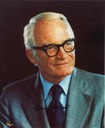Awardees from Princeton, East Brunswick and Collegeville, Pa., distinguished in molecular biology/biochemistry and physics
NEW BRUNSWICK, N.J. – The research accomplishments and stellar academic records of three Rutgers undergraduates in the School of Arts and Sciences (SAS) have earned them prestigious Barry M. Goldwater Scholarships, awarded for excellence in mathematics, science and engineering.
"Students in the School of Arts and Sciences have a long record of success in national and international fellowship competitions,” said Douglas Greenberg, executive dean of SAS. “This year's Goldwater Scholars are no exception. They exemplify the high standards and superb accomplishments of their school. We are very proud indeed of what they have achieved."
According to the Goldwater Foundation, Goldwater Scholars often garner the attention of prestigious post-graduate fellowship programs, such as the Rhodes, Marshall and Churchill scholarships and awards. Rutgers senior Simon Gordonov, who was a Goldwater Scholar in 2009, recently won a Churchill Scholarship for study in Cambridge, England.
Arthur D. Casciato, director of the Office of Distinguished Fellowships, echoed him. “The best undergraduates at Rutgers
Yuliya Afinogenova’s interest the biological sciences began in high school, not long after her family immigrated to the United States from Russia. “I decided to attend Rutgers mostly due to the vast research opportunities that are available here on campus,” she said. “As soon as I arrived at the university, I eagerly started looking for research.”
Through a collaborative arrangement with the University of Medicine and Dentistry of New Jersey (UMDNJ), she has done toxin-antitoxin research in the laboratory of Nancy Woychik, an associate professor at the school, whom Afinogenova calls “an inspirational mentor.” Her work with Woychick led to a prestigious internship in California. She currently works in the molecular biology lab of UMDNJ Professor Masayori Inouye.
Afinogenova carries a 4.0 GPA while majoring in molecular biology and biochemistry and in economics, and minoring in chemistry and mathematics. “With this award, I am hoping to dedicate my future to working at the interface of research and medicine,” she said.
Edward Lochocki is majoring in physics and mathematics with aspirations for a career in academia. He has completed research projects in astrophysics at Rutgers and accelerator physics at Cornell University. Working with Andrew Baker, assistant professor of physics and astronomy, on a project through the Aresty Research Center, Lochocki used sophisticated tools and complex calculations to measure the ratio of carbon dioxide to molecular hydrogen in a distant galaxy. At Cornell, he built particle accelerators in a National Science Foundation-funded summer program for undergraduates.
Baker describes Lochocki as a natural researcher. “Within weeks of his starting work on the project, I found myself frequently forgetting that he was [an undergraduate],” he wrote in his nomination. His current adviser, Weida Wu, assistant professor of physics and astronomy, said Lochocki “has great potential to become the future ‘supernova’ in academia.”
As a sophomore, Greg Zegarek will receive a Goldwater Scholarship for the next two years and expects to continue his research in neuroscience toward a future career in medicine. He has a 4.0 GPA while double-majoring in molecular biology and biochemistry and philosophy.
“I have always been fascinated by the brain and cognition – philosophically and biologically,” he said. He said he chose Rutgers because of its strength in the natural sciences.
Since last year, Zegarek has been doing genetic research on the role of a particular gene in dendrite branching in the brain at the laboratory of Bonnie Firestein, associate professor of cell biology and neuroscience. In Zegarek’s nomination, Firestein said he stood “above the rest of the students” who were vying for a coveted spot in her crowded lab.
While he says most of his spare time is spent in Firestein’s laboratory, Zegarek still manages to play volleyball and soccer, teach SAT prep classes and serve as an organic chemistry discussion group leader for Rutgers’ Office for Diversity and Academic Success in the Sciences (ODASIS) program.

“I would like to thank Dr. Casciato as well as my research mentors and science professors at Rutgers for many inspirational experiences and encouragement,” Afinogenova said.
This marks the second time Rutgers has had three Goldwater Scholars in the same year, according to Casciato. The last was in 2006.
The Goldwater Foundation is a federally endowed agency established by public law in 1986. The scholarship program honoring the late U.S. Sen. Barry M. Goldwater was designed to foster and encourage outstanding students to pursue careers in the fields of mathematics, the natural sciences and engineering. It is regarded as the premier undergraduate award of its type in these fields.
Media Contact: Sandra Lanman
732-932-7084, ext. 621
E-mail: slanman@ur.rutgers.edu